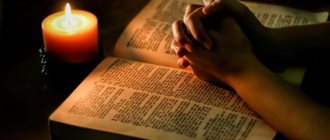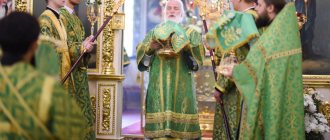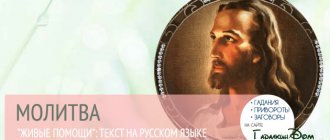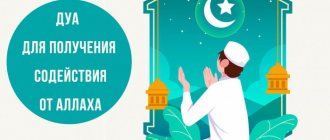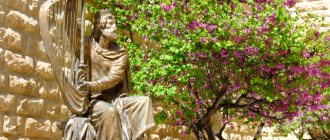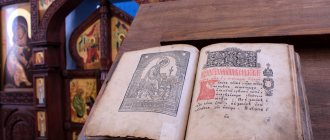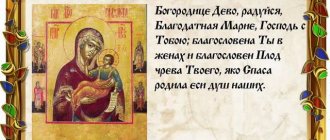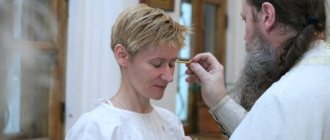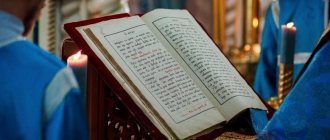Anyone who has heard at least once about “Psalm 90” (the text of the prayer is given below) has probably wondered: why is it read? Psalm number 90 is a prayer endowed with enormous power: it can protect from all manifestations of evil and negativity, from unkind people, from evil spirits.
The ninetieth psalm is the strongest amulet. This prayer exhibits its protective properties not only when it is directly pronounced. The function of the amulet “Psalm 90” is well preserved when written by hand on a piece of paper, a piece of leather or fabric. If you carry this “letter” close to your body, it will protect you from any misfortunes and misfortunes, accidents, ill-wishers and enemies, magical and other types of energy influence from the outside.
Mention of “Psalm 90” is found even in the Gospel (Matthew - 4:6; Luke - 4:11). While the Savior was fasting for 40 days in the desert, Satan tempted him. In order not to succumb to demonic machinations, Christ read the 11th and 12th verses of this prayer.
In Western Christianity, the ninetieth psalm is read or sung during evening worship; in the Middle Ages it was a mandatory part of the readings on Good Friday.
And the Eastern Church uses prayer at funerals and memorial services, and “Psalm 90” is an indispensable part of the 6th hour service.
Text of the prayer “Psalm 90”
Download the text of the prayer (printable version)
In Church Slavonic
“Psalm 90” is recommended to be read in Church Slavonic, although there are also translations of the prayer into modern Russian. The reason lies in the fact that during translation it is impossible to convey with absolute accuracy the deep meaning and content of the prayer text, its key idea.
In Church Slavonic, “Psalm 90” reads as follows:
Translation into modern Russian
In the Synodal translation into modern Russian, the text of the prayer “Psalm 90” is as follows:
Stresses in the modern version are read according to the usual rules of the Russian language.
Why you need to pray
Prayer is both a right and an obligation. The means and opportunity to ask, not forgetting to repent regularly. You cannot pronounce words monotonously, mentally being under the impression of current worries. Prayer is a special kind of thing that requires detachment from earthly vanity.
A person is weak; it is incredibly difficult for him to follow the path of the righteous, following the example of Jesus Christ and the saints of God. We often see that he resorts to God’s help in moments of despair caused by life’s difficulties. Taking Psalm 90 in his hands and looking into the eyes of God, he whispers holy words, trusting in the mercy of the Creator.
The oldest text, the authorship of which is attributed to King David, has truly miraculous powers. Interesting names obtained from most sources:
- Gospels of Matthew and Luke - Psalm 90.
- Psalter of the Russian Orthodox Church - “Alive in Help.”
- Greek Christian Literature - "David's Song of Praise."
- The Latin version is Quihabitat.
History of the origin of prayer
“Psalm 90” originates from the biblical book “Old Testament: Psalms” - there it comes under number 90 (hence the name). However, in Masoretic numbering it is assigned number 91. In the Christian religion, this prayer is also known by its first words: in Latin - “Qui habitat”, in Old Slavonic (Church Slavonic) - “Alive in help”.
Regarding the origin of “Psalm 90,” researchers are of the opinion that its authorship belongs to the prophet David. He wrote it in honor of his deliverance from a three-day pestilence. This prayer is also called the “Song of Praise of David” - under this name it appears in the Greek Psalter.
Psalm 90 in Church Slavonic with accents
I. “He who lives in the help of the Most High will dwell in the blood of the Heavenly God.
II. Says the Lord: You are my protector and my refuge, my God, and I trust in Him.
III. For He will deliver you from the snare of the trap, and from the speech of rebellion,
IV. His splash will overshadow you, and under His wing you hope that His truth will surround you as a weapon.
V. Fear not from the fear of the night, from the arrow that flies in the days,
VI. from the thing that passes in darkness, from the cloak, and the midday demon.
VII. Thousands will fall from Your country, and darkness will be at Your right hand, but it will not come near You,
VIII. Behold both Thy eyes, and see the reward of sinners.
IX. For You, O Lord, are my hope, You have made the Most High Your refuge.
X. No evil will come to You, and no wound will come near Your body,
XI. as His Angel gave a commandment about You, to preserve You in all Your ways.
XII. They will lift you up in their arms, lest they dash your foot against a stone,
XIII. tread on the asp and the basilisk, and cross the lion and the serpent.
XIV. For I have trusted in Me, and I will deliver, and I will cover, because I have known My name.
XV. He will call to Me, and I will hear him: I am with him in tribulation, I will wear him out, and I will glorify him,
XVI. I will fill him with long days, and I will show him My salvation.”
Contents and main ideas of the prayer “Alive in Help...”
Psalm 90 is one of the most powerful prayers. The text of the psalm is permeated with the idea that the Lord is the protector and reliable refuge of all those who believe in him. He convinces us that a person who sincerely believes in God with all his heart may not be afraid of any danger. “Psalm 90” conveys the idea that faith in the Most High has irresistible power. Elements of prophecy can also be found in prayer - it points to the coming of the Savior, who is the most important protector of any believer.
“David’s Song of Praise” is distinguished by expressive poetic language. It has its own clear structure. It can be roughly divided into three parts:
- The first part is verses one and two.
- The second part is verses three to thirteen.
- The third part is verses fourteen to sixteen.
How is Psalm 90 interpreted?
The text of the prayer is divided into lines - verses. Exegetes - interpreters, explain the sacred document as follows.
First, a teacher appears before the reader, who pronounces instructions on gaining hope and trust, granting the protection and guidance of God. He convincingly shows what evils and enemies you can protect yourself from by relying on the help of the Almighty and giving Him all of yourself.
God Almighty, through the hands of Angels, invisibly and secretly provides protection, participation, support and protection.
In the second part of the text, the Almighty praises the righteous human creature, who lives piously and virtuously, therefore, he is protected from life’s adversities and is given a long life.
This hymn is about Faith and Trust. If you read the verse of the psalm, the clear and great meaning will be revealed to your soul that we all walk under the protection of the Almighty.
She, this protection, is granted to all who believe and entrust their lives to the Lord. A righteous person who lives in harmony with the world will not attract evil and violence to himself.
Most often, people come to God when they feel inner fatigue and disappointment, when an unbearable burden of problems has accumulated and it seems that the whole world is against them. This psalm is charged with powerful energy that can restore joy and fill life with light and love.
Interpretation of the prayer “Psalm 90” and why it is read
Unfortunately, not everyone understands “Psalm 90” without a full interpretation. If we analyze each verse of the prayer, we get the following:
- Those who live under the help of the Lord will be under God's protection. As Saint Athanasius believed, God’s help means the divine commandments that the Lord himself gave to people. Keeping these commandments can protect you from demons and all kinds of misfortunes. Accordingly, only those who live by these commandments will be under divine protection.
- A person who has unshakable faith in God can call the Lord his “refuge” and “intercessor.”
- The Lord will deliver man from the “net of the trap.” “The catcher’s net” is an allegorical image, meaning an attack on the body - physical and demonic (i.e. lust, sinful passion). God will also deliver from “rebellious speech,” which means slander that causes rebellion and unrest in the soul of the slandered person.
- God loves the truth, therefore, only the person who is sincere with the Lord will be completely safe, under his reliable “wing.”
- Those who live in the help of God are not afraid of night fears coming from demons or bad people (robbers, thieves, etc.), nor are they afraid of arrows - physical, hitting the body, and mental, coming from demons and passion.
- He who lives in the help of the Lord may not be afraid of “things that pass in darkness” (demonic passion, fornication), “the noonday demon” (laziness, carelessness).
- A thousand or ten thousand arrows will not harm the one who lives in the help of God. Arrows mean temptation to commit sins, devilish machinations that counteract a righteous, godly life.
- God's help will help us see with our own eyes the retribution of wicked people.
- Strong protection from the Lord will come for the reason that the believer trusts in God with all his heart and mind, sees in him his intercessor.
- No evil will come close to a person who trusts in God; everything corporeal, possessing a material shell, will be protected from troubles and diseases.
- God protects the person who trusts in him through the Angels.
- The angels will carry the believer in their arms, and the person will not stumble over a stone. The hands of Angels are a symbol of the protective force that will protect a person during temptations and difficult life situations. The stone symbolizes sin, everything that acts as an obstacle to virtue.
- A person who trusts in God is not afraid of snakes and large predators. Asp and basilisk are poisonous snakes. Asp is a symbol of slander, basilisk is a symbol of envy (both one’s own and that of other people). The lion and dragon symbolize harshness and inhumanity. A righteous person is able to overcome all these negative manifestations.
- Man trusts in God, so the Lord protects him and delivers him from all danger. Only those who lead a righteous life and keep the commandments given to them truly know God’s Name.
- God will hear the person who trusts in him if he calls to Him. The Lord will be with him in sorrow, deliver him and glorify him in earthly and eternal life.
- The Lord gives eternal life as a reward to a person who trusts in God, and can also extend his earthly life.
The Lord hears everyone who says the prayer “Psalm 90” and never refuses his help. God is merciful, therefore he often helps a person who has sinned a lot in his life, if he, when reading a prayer, turns to the Lord with deep and sincere faith in his heart, with trust in Him.
How Psalm 90 can help
Psalm 90 is a powerful prayer designed to protect people living in strong faith from the following misfortunes:
- any kind of evil;
- blows of fate;
- death threat;
- envy, slander and slander;
- dirty conspiracies;
- horrors and fears;
- any danger;
- illnesses and terrible diseases;
- enemies and dangerous enemies;
- temptations and temptations;
- small and great sin;
- various troubles.
The effect of this psalm can be strengthened by the following combination of prayers: first, you must read the prayer to the Most Holy Theotokos, then, in order, psalms 26, 50 and 90.
This order is called “preservation prayers.” They are used, for example, in armed conflicts, military operations or in difficult life situations. That is, prayer also helps to repel enemies.
Many, in our difficult times, are in constant fear and anxiety for their future, in a state of irritation and dissatisfaction with themselves, lack of confidence in their abilities, which clearly interferes with enjoying the flow of life.
In everyday life, when many concerns are related to making money and the desire to do it faster and easier, temptations appear that counterbalance spirituality.
But the longer a person practices reading the psalm, the more confident and calm he and his surroundings become; fears and temptations are replaced by unconditional trust and happiness.
In the Orthodox Church, this hymn is read at services during the day or evening, and also at memorial services and funeral services. It flows very harmoniously into the spiritual life of the church.
Psalm that helps
There are many stories that tell of the support and protection that was received from the sacred text. Women - mothers, in difficult times, wrote the words of the psalm by hand, folded it several times and sewed it into a canvas bag.
The result was a talisman that had the power of the text itself and a mother’s request for the protection of her son or daughter. This amulet was placed in a clothing pocket. He saved me from trouble more than once.
There is a known case when a man’s jacket was stolen, in the pocket of which there was such a talisman. The thief was unable to escape, as an unknown force led the owner of the jacket in the footsteps of the thief. In the end, they met face to face and the jacket was returned to its owner.
The miraculous amulet more than once saved the lives of soldiers participating in hostilities. Many people put the text of the anthem in their car to protect against unforeseen circumstances.
The printed text of the psalm, of course, can be bought today and, nevertheless, a text written from the heart and with unshakable trust can be of great benefit, because the feelings and aspirations of the believer are embedded in it.
The words of the hymn are placed in amulet and this amulet is hung around the neck, printed on belts or ribbons. The Orthodox Church does not approve of such use, nor does it prohibit it.
We must clearly understand that it is not the amulets themselves that save a person, but God, to whom our prayers are addressed.
Some historical facts
There are significant differences in the description of the origin of this psalm. Those who adhere to Judaism claim that Moses wrote these lines, and Christians attribute the authorship of the psalm to David.
Some people who interpreted the content of Psalm 90 compare this text with the victory of the Judah king Hezekiah over the Assyrian army, in which the king relied entirely on the help of the All-Merciful and received it.
Initially, this document was known in Hebrew, then, thanks to translation from Hebrew, the following appeared: Greek version (Septuagint), Latin version (Vulgate), Russian version (Synodal), Church Slavonic, English (King James Bible).
Advice from clergy
As they say from time immemorial, man does not live by bread alone. This expression contains the principle of the need for spiritual achievement, which consists, first of all, in reading prayers. Correct interpretation of the Lord's commandments requires constant spiritual search and work, which consist in constant comprehension and study of God's providence. And the standard behavior for a person can be considered the behavior of Jesus Christ, described in the Holy Scriptures.
For a sinless existence, a person will need to study a large number of religious texts, but defeating the root cause of sin in the form of temptations and sinful desires can be done by reading “Psalm 91,” which is best known by heart as a spiritual shield from the attacks of the devil. This was explained very clearly by Theophan the Recluse, arguing that only with this approach to the problem can a person constantly reveal more and more new facets of the thoughts and feelings contained in the text.
